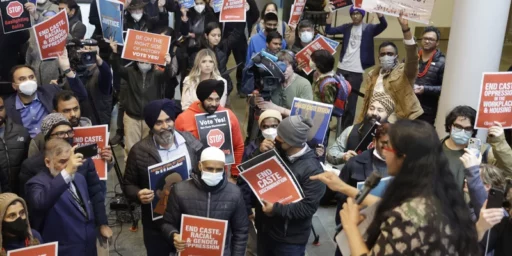NYC Bans Height-Weight Discrimination
They join DC and San Francisco.

ABC News (“New York City outlaws discrimination on the basis of weight, height“):
New York City Mayor Eric Adams signed legislation Friday that will ban discrimination based on body size by adding weight and height to the list of protected categories such as race, sex and religion.
“We all deserve the same access to employment, housing and public accommodation, regardless of our appearance, and it shouldn’t matter how tall you are or how much you weigh,” said the mayor, who joined other elected officials as well as fat-acceptance advocates at a City Hall bill-signing ceremony.
Adams, a Democrat who published a book about reversing his diabetes through a plant-based diet, said the ordinance “will help level the playing field for all New Yorkers, create more inclusive workplaces and living environments, and protect against discrimination.”
Exemptions under the ordinance, which the city council passed this month, include cases in which an individual’s height or weight could prevent them from performing essential functions of a job.
Some business leaders expressed opposition to the legislation when it was before the council, arguing that compliance could become an onerous burden.
“The extent of the impact and cost of this legislation has not been fully considered,” Kathy Wylde, president and CEO of the Partnership for New York City, said in a statement.
Several other U.S. cities have banned discrimination based on weight and physical appearance, including San Francisco, Washington, D.C., and Madison, Wisconsin. And legislation to ban weight and height discrimination has been introduced in states including New Jersey and Massachusetts.
Tigress Osborn, the chair of the National Association to Advance Fat Acceptance, said New York City’s weight discrimination ban should serve as a model for the nation and the world.
Osborn said the city’s adoption of the new ordinance “will ripple across the globe” and show that “discrimination against people based on their body size is wrong and is something that we can change.”
I’d be curious to see how similar laws played out in San Francisco and DC. Given that I’m DC-adjacent and was unaware that the ban had gone into effect, it may be that the negative impact was de minimus.
Without such data, my instinct is similar to Wylde’s. Business owners have a better understanding of their customers than the city council. If the establishment—say, an exclusive night club or posh restaurant—is selling an aesthetic, then hiring based on appearance may well be a necessity.
Does Hooters now have to hire 400-pound waitresses?
Will Broadway shows casting the part of “the hot girlfriend” face lawsuits if they only hire people who are conventionally hot?
Then again, other anti-discrimination laws pose similar theoretical problems. So far as I know, Hooters hasn’t been required to hire 70-year-old waitresses and Broadway shows haven’t been forced to hire 80-year-olds to play the part of 20-year-olds, despite the outlawing of age discrimination. Ditto, at least in the latter case, casting of Black actors to play Black roles and Asian actors to play Asian roles.
Presumably, this is because those businesses can claim a bonafide occupational rationale for discrimination.
On the other hand, the landmark case bringing transgender individuals under the protection of Title VII’s anti-sex discrimination law involved similar circumstances. The funeral home fired a longstanding employee when they transitioned from male to female. Regardless of one’s view of the law in question, one could certainly see the customers of a family-owned funeral home being uncomfortable with a transwoman, particularly one that didn’t present as traditionally feminine, in a public-facing role and, indeed, choosing to take their business elsewhere as a result.* The law doesn’t seek to balance that concern with the rights of the individual employee.
Practicalities aside, it’s interesting that the morbidly obese remain one of the few groups it’s still common to openly disdain in America while, at the same time, the percentage of Americans who are obese continues to climb. We may be passing these laws at a point where it’s damn near impossible not to hire people who are visibly overweight, given how many of us there are.
_______
*The funeral home in question was in Detroit, not small-town Mississippi, so that’s perhaps less a concern in the particular case in controversy.






Perhaps this is an indication that fat people will become the new Trans/Gay/Bisexual/Black/Japanese/Chinese/Irish/….. conservative “other” target once trans folks become better understood broadly by society.
My guess is it won’t take long before trans-bashing runs its course and they have to move on to a different minority group.
The trouble with weight is that it’s going to become a real “Leopards Ate My Face” moment for a lot of evangelicals, particularly in the South.
@Tony W:
I doubt it… Have you seen their base?
If you’re going to be the stalking horse for reasoned arguments for permitting bias, you’re going to need less hackneyed examples than 40o-pound Hooter’s servers and casting the “hot girlfriend” in a Broadway play. Sheesh! SHM! Headdesk! [The green throwing up emoji] :-X
Overweight…or obese? There’s a big (no pun intended) difference.
Who will be the arbiter?
@CSK: It appears to be “body size,” period. In DC, it’s actually “appearance” discrimination that’s prohibited.
@James Joyner:
So if you’re overweight but expertly groomed and very well-dressed you pass muster? I really am curious about what distinctions will/can be made.
@CSK: It’s a little weird. Here’s what the DC government website says, at the outset,
That seems absurdly broad. But, then, in the discussion section, it becomes much more reasonable:
I’m not sure a t-shirt and a tank top are equivalent but, presumably, the target here is the piercing.
@Tony W:
Republican/Evangelical hate targets seem to involve narrower and narrower groups. Blacks are 13% of the population. Gays maybe 6%. Trans are what, 1%? So we’re going to need an even smaller slice of the population next. The obsession with drag queens, who can’t be more than, what, a tenth of a percent (few biological males can handle stiletto heels) of the population, is interesting in that regard.
But I’m thinking Furries next. I mean, do we want children exposed to adults dressed up as My Little Pony? Imagine the confusion in young minds! Am I good, Christian child of Jesus-uh, or am I a pink pony? Mommy! Daddy! Can I grow a tail? Waaaah!
#PoohIs aGroomer!
I suspect that the rule will have a greater effect on terminations than hiring. Except for the most egregious examples in hiring, such as, the hiring manager doing or saying something discriminating or an extensive pattern of discrimination, it is quite easy to explain away not hiring a particular person.
@Michael Reynolds:
Any attempt to move against the furries will be thwarted by the fact that we secretly control the internet.
Also, never mess with the SWFs (suspiciously wealthy furries)
@Michael Reynolds: I’m pretty sure that the far right lumps drag queens and furries under the trans umbrella.
Certainly the laws banning drag performances around children are aimed at trans folks who dress as their actual gender.
Its interesting to me because there’s a continuum of how much control people have over the categories that are protected or will be protected from discrimination.
I suspect the reason you still hear people make fun of obesity is because most people do actually have significant control over it. They may not be well educated about it (people sipping “diet” cola all day long because it technically has zero calories, and yet why are they still overweight and in poor health?), but just the very fact that Americans are gaining weight show that we have the ability to change it. It’s just not a priority for most people.
Another category that you can control is your religion. But kids are mostly brainwashed and it’s just easier to be the same religion as your family and friends.
Some other categories, some people may still perceive as a choice (sexual orientation and gender identity). I’m not saying they are, I’m mostly talking about perceptions.
Sex and height are awfully difficult to change, and then there’s race which is impossible to truly affect so far as I know (ignoring skin whitening and other cosmetic stuff).
@Franklin:
Research is continually showing people have far less control over their weight than we imagine, particularly in the face of companies whose business plans are based on deliberately maximizing the addictivness of their products
@CSK:
“Two men enter, one man leaves”?
“Regardless of one’s view of the law in question, one could certainly see the customers of a family-owned funeral home being uncomfortable with a transwoman, particularly one that didn’t present as traditionally feminine, in a public-facing role and, indeed, choosing to take their business elsewhere as a result.*”
And some people would be uncomfortable with a Muslim/Black/cis woman in a public facing role because they’re bigots and would take their business elsewhere. Yet we allow those protections.
@Michael Reynolds: With regard to the shrinking “other” demographic, it occurs to me that when bullying, it’s helpful when the target can’t fight back.
But they underestimate Pinky Pie – she’s one tough cookie.
@Franklin:
About as much as they have over their wealth, according to the research I’ve seen. Which is to say, quite a bit at the margins, but on nothing like a level playing field. (Hat tip to @Stormy Dragon for getting there first.)